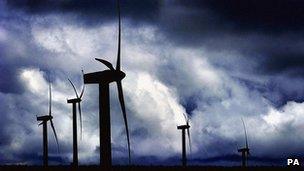Harrabin's Notes: Climate shuffles
- Published

Searching for the "right place": Onshore wind farms are cheaper to develop than offshore ones
It's now a week since the reshuffle and I'm giving up asking if our Environment Secretary Owen Paterson and Energy Minister John Hayes are sceptical of climate science.
I've asked Defra and DECC repeatedly since then if the two men accept the scientific conclusions of the Intergovernmental Panel on Climate Change (IPCC) on which UK climate policy is based. But I haven't had a reply.
The DECC press office simply ignore the question, whilst a source at Defra told me it wasn't a priority for Mr Paterson to answer when the need to stimulate the rural economy was so pressing.
The sceptic question arose because both men have spoken strongly against wind power, external.
Both are keen de-regulators and Mr Paterson is pushing a new "dash for gas, external", a policy the Committee on Climate Change says is incompatible with mandatory targets under the Climate Change Act to reduce emissions 80% by 2050.
The environmentalist George Monbiot called the appointments a "declaration of war on the environment, external" by the prime minister, and there's been plentiful speculation in the media on the ministers' attitudes on this key environmental issue.
There hasn't been total silence from Whitehall. The Guardian asked: "What is the secretary of state's view on climate change, external? Will he deny he's a climate change sceptic?"
The reply was: "Defra is responsible for a range of issues affecting the environment and the rural economy. One of these issues is the impact of climate change and the secretary of state is committed to exploring and developing the response required by government, business and communities."
Later, at a meeting with staff at Defra, Mr Paterson was asked about his views on climate change. Richard Betts from the Met Office says he acknowledged that the climate had changed and that humans were in part responsible.
Carbon targets
Neither of these lukewarm statements will reassure people concerned that the UK should meet its own climate change laws.
Then Mr Hayes put out a statement, external: "I am proud to assume the role of energy minister at such a crucial time both for our energy security and for tackling climate change. We face a major challenge to keep the lights on in the most cost-effective way. In achieving this, we must not be over-reliant on any one technology, but build a balanced low-carbon mix and make the best use of Britain's domestic energy resources and skilled workforce."
He told BBC Lincolnshire: "Energy security… is central to this new role I have … and central to the government's ambitions on the economy and wider society. There's certainly a place for renewables, and that includes wind, but it has to be in the right place."
This again raises questions. Wind farms on land are increasingly controversial but they do represent the cheapest feasible way of meeting CO2 targets. If the "right place" for wind power is offshore, that will multiply the price.
Roger Helmer, the UKIP MP who does not accept mainstream climate science, tweeted, external: "Greens & wind industry dismayed at appointment of John Hayes MP as Energy Minister. Excellent!"
Cabinet relations
So what impact will the two men have on the government's green agenda? Well, on fisheries Mr Paterson has been welcomed by environmentalists as a prescient champion of conservation.
But in Cabinet, he'll surely prove an adversary for the Lib Dem Energy Secretary Ed Davey as he tries to steer through an Energy Bill in coming months. The policy can't work without the subsidies for clean energy that Mr Paterson wants to see scrapped.
And within DECC, Mr Davey's position must be weakened in some way by the advent of a minister with views very different from the previous incumbent, Charles Hendry, who was massively popular with the renewables industry.
If nothing else, the reshuffle changes amplify the new tone from the government which once promised to be the greenest ever. Interesting times.
Follow Roger Harrabin on Twitter: @rogerharrabin, external
- Published15 August 2012
- Published8 August 2012
- Published14 May 2012